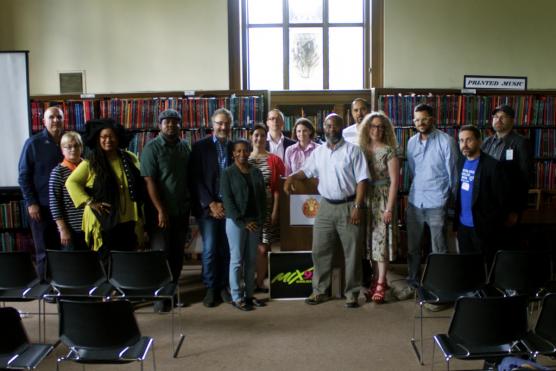Dear Mayor-Elect Duggan,
I am writing today to propose that I join your administration in the critical area of culture and entertainment policy. Specifically, I want to be Detroit’s first musical ambassador and help Detroit reclaim its rightful status as a global music capital. In 2011, after over fifteen years of working as a writer, entrepreneur, and scholar in Detroit’s music industry, I founded an organization called the Detroit Sound Conservancy in order to preserve what music producer Don Was has called “the indigenous music of Detroit.” My goal is to bring my extensive experience in the music industry, including two informative and trailblazing years at the DSC, to the City of Detroit, and forge the policy leadership required in the Mayor’s office in the city’s most important cultural and economic area: music. As a proud Detroiter, with national experiences and networks to share, I am excited about the possibility of working for your administration.
Detroit is at an entertainment crossroads. According to a study conducted by Anderson Economic Group in Lansing, Detroit-area musical businesses employ thousands and participate in a market worth over a billion dollars. This economic snapshot mirrors recent cultural victories for Detroit like the film Searching for Sugarman, featuring Detroit songwriter Sixto Rodriguez, winning an Oscar in 2012 for “Best Documentary,” and Detroiter-by-association Eminem entering Billboard at number one just this last month. Annual music festivals, like the Movement Festival and the Jazz Fest, continue to bring local, national, and global music downtown.
At the same time, it is clear that Detroit’s entertainment culture is in trouble. Despite our touting of Detroit as a rock ’n’ roll city, our last great rock prophet, Jack White, relocated his home and musical life to Nashville, Tennessee. Despite his raw talent, Eminem was not able to launch his career in Detroit but instead had to travel to Los Angeles to be “discovered.” Despite our pride in Motown as a cultural product, Motown musicians continue to die in obscurity, without healthcare nor notice from their city. Though Detroit is synonymous with Motown, there is no Preservation Hall Motown Band to go see the minute you step off an airplane from the McNamara Terminal. Simultaneously, the oldest independent music studio in the United States, United Sound Studios, where John Lee Hooker and Aretha Franklin recorded, is threatened by an I-94 service drive expansion instead of receiving tax breaks to reopen. Depressingly, the City of Detroit has done little to create an atmosphere for musical entrepreneurship or preservation. What can a new Mayor’s administration do about this situation, especially in a time of advanced economic crisis?
The answer is we can do a lot. I know that you believe in the power of listening. Detroit must be heard. We must encourage Detroit to sing, dance, and boogie again. Detroit’s music culture must resonate throughout the world so that the simplistic narrative of abandoned houses and decaying neighborhoods is no longer the primary way Detroit is understood or experienced.
Based on my extensive research in Detroit music history and culture, experience within the music industry, and leadership role at the Detroit Sound Conservancy, I am convinced we must make progress in four overlapping areas:
Leadership — Like Austin, TX, the Mayor must be directly involved in the cultural life of his city. We have a Detroit Entertainment Commission which was founded in 2008 but previous Mayors have yet to take an active lead in helping it to fulfill the group’s mission or produce a comprehensive plan for Detroit music and entertainment. There must be a master plan that connects large projects downtown and corner music clubs within the neighborhoods. The Mayor’s office could provide this sonic management. With my already-existing connections within Detroit’s music community, I can help you implement this vision.
Performance — Music must cascade out of every bar and venue that will have it. Everything that blocks Detroit musicians from making a living in their own city, from lack of healthcare to lack of venues to play, must be removed. Streets like Michigan Avenue need to be supported to become musical corridors. Areas like the North End must be given the support to bring music again to Oakland Avenue. Music studios along West Grand Boulevard must be recognized and supported as the new “Studio Row.” The Mayor’s office could deputize musicians as powerful entrepreneurial and cultural forces in the city. As a former member of Detroit’s musician union, Local 5, and a longtime scholar of Detroit music history, I can help you carry out this goal.
Tourism — As of this writing, there is no official music tour of Detroit that anyone can take of Detroit’s musical landmarks. There is no bus that departs every evening from Detroit’s metro airport that goes to Bert’s in Eastern Market to the “Preservation Hall Motown Band.” It is a crime in a city like Detroit that musical tourists to our city have no official help in preparing their travel. The Mayor’s office could make music tourism an all-year-round industry that foregrounds the best of what Detroit has and should be. I have already built a pilot tour around Detroit music with the Detroit Sound Conservancy. I can help you take Detroit music tourism to the next level.
Historical Preservation — The City must provide leadership in the realm of music preservation. We must honor our fallen musicians with parades and public pronouncements through the Mayor’s office. We must stop tearing down our musical landmarks. If we continue along this path, the Mayor’s tenure as leader of Detroit will be known as the administration when the music, and our memory of it, died. The Mayor’s office could stem the tide. With my experience advocating for Detroit’s musical landmarks, I can help you lead the charge.
I can provide the research, planning, and community outreach in Detroit’s musical culture to execute within these areas. If given the opportunity, I will help make your administration a political model for cultural renewal across the country. Recently, blues historian and lifelong Detroiter, Keith Owens wrote in the online publication Model D., “if Detroit music isn’t helping to steer the wheel then we’re bound to wind up lost.” I agree. I would be happy to discuss my qualifications further with you. I look forward to hearing from you and setting up a time to discuss what can and should be in the city that we both love.
Sincerely,
Dr. Carleton S. Gholz
















